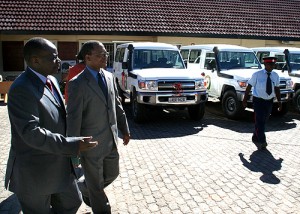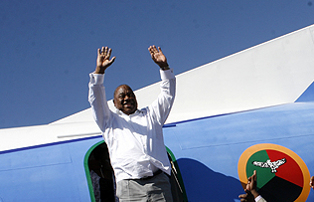Herve Renard has summoned three CHAN veterans excluding Power Dynamos left-winger Kennedy Mudenda as supplementary home-based personnel for Zambia’s 2010 African/World Cup Group C training camp that begins in Lusaka on Monday.
The trio called to supplement the seven home-based call-ups who go into camp on Monday in Lusaka including Zesco United midfielder William Njobvu.
Renard has also brought in the Zanaco midfield duo of Ignatius Lwipa and Henry Banda.
The trio is part of another 15 players call-up to help form a quorum for the locally based players training camp in Lusaka.
However, Mudenda who had an impressive CHAN outing as a substitute during the tournament held in Cote d‘Ivoire from February 22 to March 8 has been overlooked for the training camp.
The seven players expected to travel to Johannesburg for Zambia’s final leg of training camp on May 17 where they will be joined by the foreign-based players are Power Dynamos defensive midfielder Francis Kasonde, Zanaco striker Given Singuluma plus the Green Buffaloes duo of defender Dennis Banda and goalkeeper Dave Kaumbwa.
Others are midfielder Jonas Sakuwaha, defenders Nyambe Mulenga and Hichani Himoonde all of Zesco United.
Team:
Emmanuel Masuwa (Chambishi), Davy Kaumbwa, Dennis Banda, Edward Musebo (All Green Buffaloes), Mukuka Mulenga (Kabwe Warriors), Timothy Mbewe, Jimmy Chisenga, Goodson Kachinga (All Red Arrows), Francis Kaonde (Power Dynamos)
Kennedy Mumba, Moses Siansumo (Both K-Stars), Joshua Titima, Percy Kisonge (Both Zamtel), Chalwe Katongo, Stanley Nshimbi (Lusaka Dynamos), Bernard Bwalya, Henry Banda, Ignatius Lwipa, Given Singuluma (All Zanaco), Innocent Mwaba, Jackson Mwanza, Nyambe Mulenga, Jonas Sakuwaha, Hichani Himoonde (All Zesco)
WEEKEND FOOTBALL FIXTURES
Faz Premier Division
09/05/2009
Week 9
Zamtel- Young Arrows
Red Arrows- Zanaco
Lusaka Dynamos – Power Dynamos
Roan United-Nakambala Leopards
Choma Eagles-Kabwe Warriors
Forest Rangers-Chambishi
Konkola Blades-City of Lusaka
Green Buffaloes-Zesco United
Division 1
10/05/2009
North
Week 10
Afrisports- Chindwin
Chingola Leopards- Mining Rangers
Indeni- Muchindu
Lime Hotspurs-Nchanga Rangers
Mufulira Blackpool-Luanshya United
Ndola United-Mufulira Wanderers
Zesco Luapula-Kalewa
Nkana-Kalulushi Modern Stars
Prison Leopards- Kitwe United
South
Week 10
Petauke United- Paramilitary
Green Eagles-Nampundwe
Luena- Lusaka City Council
Profund Warriors- Riflemen
Livingstone Pirates-Nkwazi
Lusaka Celtic-Zamcoal Diggers
Mazabuka United-Lusaka Tigers
Young Green Eagles- Kascol
Police Bullets- National Assembly




